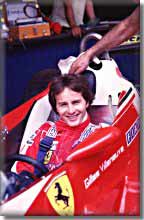| ||||
He combined a dazzling talent, an unquenchable spirit and desire, and a magnetic charisma that attracted millions of fans. He also possessed an honesty and honour from a bygone age - traits which were to be contributing factors in his death. That man was Gilles Villeneuve, whose brief but glorious career ended on 8 May 1982, in an accident during qualifying for the Belgian Grand Prix at Zolder. No human being can do miracles, but Gilles made you wonder Like so many who have died when their star was burning brightest, Villeneuve has passed into immortality as one of F1's greatest heroes. But it was not just an early death that granted him legendary status, it was the swashbuckling way in which he lived his life. In a career that spanned just four-and-a-half years, Villeneuve won only six of his 67 Grands Prix. Yet his rivals were well aware of just how good he was - and that they were fortunate he spent most of his career in uncompetitive cars. Alain Prost, whose record of 51 Grand Prix victories was broken by Schumacher last year, was one of them. "Gilles was the last great driver," Prost said a year after the French-Canadian's death. "The rest of us are just a bunch of good professionals." That remark somewhat undersells Prost, who went on to have his own great career in which he won four world titles. But it sums up what people felt about Villeneuve. Villeneuve spent all but one race of his career at Ferrari, at a time when they were going through a difficult period in their history. So it was all the more impressive that he could forge such an iconic status. Ferrari gave him two potentially title-winning cars in his time with the team. He would have won the world championship in one in 1979 had he not obeyed team orders and sat dutifully behind his team-mate Jody Schecketer at the Italian GP. Had Villeneuve won that race, he would have been champion - but he stayed behind because he had given his word and because he was sure his time would come. That time looked like being 1982, but he was killed in just the fifth race of the year. But whatever the car, whatever the race, Villeneuve could be counted on to do something to take your breath away - and that is why he is regarded as highly as he is. Most stunning of all was his speed, which was apparent from the moment he first drove an F1 car. In a one-off race in an out-of-date McLaren at the 1977 British GP, Villeneuve qualified ninth, and after an early pit stop rejoined a lap behind but right behind the leaders. One of them was the reigning world champion, James Hunt, in a newer and faster McLaren. Villeneuve stayed with the leaders for the rest of the race, setting the fifth-fastest lap of the day. Throughout his career he did the seemingly impossible: in wet practice for the 1979 US GP at Watkins Glen, Villeneuve was fastest by 8.5 seconds - and at one point was 11 seconds quicker than any other car on the circuit at the same time, including Scheckter; At Monaco in 1980, driving the truck-like Ferrari 312 T5, Villeneuve was five seconds a lap faster than anyone else during a late-race shower of rain. Arguably his two greatest victories came in 1981 when he won in Monaco and Spain on the two tightest tracks in a car that was years behind its rivals. In Canada in 1981, he finished third with a car that had lost its front wing in a collision. But those who said he was crazy missed the point that he was usually attempting to achieve the impossible in cars that had no business being up where he had them. So why did he stay at Ferrari? Villeneuve was a motor racing romantic, to whom driving for Ferrari was like living a dream. But by the time of his death, his patience with the Italian team was wearing thin. That was much less to do with the speed of the cars than it was to do with the way he felt they responded to the incident that sent Villeneuve to his death a bitter man. Villeneuve felt that his team-mate Didier Pironi had stolen victory from under his nose as they were cruising to a one-two finish at the 1982 San Marino GP. Villeneuve was furious - with Pironi, but also with team boss Marco Piccinini, who Villeneuve felt had wrongly backed the Frenchman. He told friends that he would almost certainly leave Ferrari at the end of the year. He would quite probably have gone to McLaren, whose boss Ron Dennis had already offered him a $3m salary - a lot more than any other driver was earning. They were just embarking on a period of unprecedented domination in F1. Who knows what records might then have fallen. As it was, he crashed to his death still fuming at the injustice. One of the finest drivers the world has ever seen never got the chance to reach the ultimate heights. (Acknowledgement: Andrew Benson from BBC Online) Click here to return to the Ferrari Happenings page. |


 Twenty years ago today, Formula One lost one of its greatest ever exponents, a man whose modest record belied an impact on the sport so profound that his memory lives on as strong as ever.
Twenty years ago today, Formula One lost one of its greatest ever exponents, a man whose modest record belied an impact on the sport so profound that his memory lives on as strong as ever.